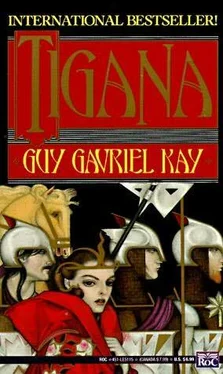Guy Kay - Tigana
Здесь есть возможность читать онлайн «Guy Kay - Tigana» — ознакомительный отрывок электронной книги совершенно бесплатно, а после прочтения отрывка купить полную версию. В некоторых случаях можно слушать аудио, скачать через торрент в формате fb2 и присутствует краткое содержание. Год выпуска: 1990, Жанр: Фэнтези, на английском языке. Описание произведения, (предисловие) а так же отзывы посетителей доступны на портале библиотеки ЛибКат.
- Название:Tigana
- Автор:
- Жанр:
- Год:1990
- ISBN:нет данных
- Рейтинг книги:4 / 5. Голосов: 1
-
Избранное:Добавить в избранное
- Отзывы:
-
Ваша оценка:
- 80
- 1
- 2
- 3
- 4
- 5
Tigana: краткое содержание, описание и аннотация
Предлагаем к чтению аннотацию, описание, краткое содержание или предисловие (зависит от того, что написал сам автор книги «Tigana»). Если вы не нашли необходимую информацию о книге — напишите в комментариях, мы постараемся отыскать её.
Tigana — читать онлайн ознакомительный отрывок
Ниже представлен текст книги, разбитый по страницам. Система сохранения места последней прочитанной страницы, позволяет с удобством читать онлайн бесплатно книгу «Tigana», без необходимости каждый раз заново искать на чём Вы остановились. Поставьте закладку, и сможете в любой момент перейти на страницу, на которой закончили чтение.
Интервал:
Закладка:
This time it was she who blinked and Catriana who looked unruffled and superior. Which was unfair, Alienor decided afterwards; the girl must have known the old man was a wizard. That was why she hadn't reacted. Alienor had enough of a sense of humor to find their by-play amusing, and even to feel a little regretful when Catriana had gone.
Two days afterwards Elena had come. Baerd had said it would be a woman. He had asked Alienor to take care of her. She had raised her eyebrows at that as well.
On the northern ramparts she glanced over in the twilight. Elena had come up without a cloak; her hands were cupping her elbows tightly against her body. Feeling unreasonably irritated, Alienor abruptly removed her shawl and draped it over the other's shoulders.
"You should know better by now," she said sharply. "It gets cold up here when the sun goes down."
"I'm sorry," Elena said again, quickly motioning to remove the shawl. "But you'll be chilled now. I'll go down and get something for myself."
"Stay where you are!" Alienor snapped. Elena froze, apprehension in her eyes. Alienor looked out past her, past the darkening fields and the emerging flickers of light where night candles and fires were being lit in houses and farms below. She looked beyond all these under the first stars of the evening, her eyes straining north, her imagination winging far beyond her sight to where the others would all be gathering now, or soon.
"Stay here," she said, more gently. "Stay with me."
Elena's blue eyes widened in the darkness as she looked over. Her expression was grave, thoughtful. Unexpectedly, she smiled. And then, even more astonishingly, she moved nearer and drew her arm through Alienor's, pulling her close. Alienor stiffened for a second, then allowed herself to relax against the other woman. She had asked for companionship. For the first time in more years than she could remember, she had asked for this. A completely different kind of intimacy. It felt, of late, as if something rigid and hard was falling away inside her. She had waited for this summer, for what it might mean, for so many years.
What had the young one said, Devin? About being allowed more than the transience of desire, if only one believed it was deserved. No one had ever said such a thing to her in all the years since Cornaro of Borso had died fighting Barbadior. In which dark time his young widow, his bride, alone in a highland castle with her grief and rage, had been set upon the road towards what she had become.
He had gone with Alessan, Devin. By now, they would probably be in the north as well. Alienor looked out, letting her thoughts stream like birds arrowing away through darkness, across the miles between, to where all of their fates would be decided when Midsummer came.
Dark hair and light blown back and mingled by the wind, the two women stood together in that high place for a long time, sharing warmth, sharing the night and the waiting time.
It had long been said, sometimes in mockery, sometimes with a bemusement that bordered on awe, that as the days heated up in summer, so did the night-time passions of Senzio. The hedonistic self-indulgence of that northern province, blessed with fertile soil and gentle weather, was a byword in the Palm and even over the seas. You could get whatever you wanted in Senzio, it was said, provided you were willing to pay for it. And fight someone to keep it, the initiated often added.
Towards the end of spring that year it might have been thought that burgeoning tensions and the palpable threat of war would have dampened the nocturnal ardor of the Senzians, and their endless flow of visitors, for wine, for lovemaking in diverse combinations, and for brawling in the taverns and streets.
Someone might indeed have thought such a thing, but not anyone who knew Senzio. In fact, it actually seemed as if the looming portents of disaster, the Barbadians massed ominously on the Ferraut border, the ever-increasing numbers of ships of the Ygrathen flotilla anchored at Farsaro Island off the northwestern tip of the province, were simply spurs to the wildness of night in Senzio town. There were no curfews here; there hadn't been for hundreds of years. And though emissaries of both invading powers were prominently housed in opposite wings of what was now called the Governor's Castle, Senzians still boasted that they were the only free province in the Palm.
A boast that began to ring more hollow with each passing day and sybaritic night as the entire peninsula braced itself for a conflagration.
In the face of which onrushing intrusion of reality Senzio town merely intensified the already manic pace of its dark hours. Legendary watering-holes like The Red Glove or Thetaph were packed with sweating, shouting patrons every night, to whom they dispensed their harsh, overpriced liquors and a seemingly endless stream of available flesh, male or female, in the warrens of airless rooms upstairs.
Those innkeepers who had elected, for whatever reasons, not to trade in purchased love had to offer substantially different inducements to their patrons. For the eponymous owner of Solinghi's, a tavern not far from the castle, good food, decent vintages and ales, and clean rooms in which to sleep were assurances of a respectable if not an extravagant living, derived primarily from merchants and traders disinclined to traffic in the carnality of night, or at least to sleep and eat amid that overripe corruption. Solinghi's also prided itself on offering, by day or night, the best music to be found in the city at any given time.
At this particular moment, shortly before the dinner-hour one day late in the spring, the bar and table patrons of the almost full tavern were enjoying the music of an unlikely trio: a Senzian harper, a piper from Astibar, and a young Asolini tenor who, according to a rumor started a couple of days before, was the singer who had disappeared after performing Sandre d'Astibar's funeral rites last fall.
Rumors of every kind were rife in Senzio that spring, but few believed this one: such a prodigy was unlikely in the extreme to be singing in a put-together group like this. But in fact the young tenor had an exceptional voice and he was matched by the playing of the other two. Solinghi di Senzio was immensely pleased with their effect on business over the past week.
The truth was, he would have given them employment and a room upstairs if they made music like boarhounds in lust. Solinghi had been a friend of the dark-haired man who was now calling himself Adreano d'Astibar for almost ten years. A friend, and more than that; as it happened, almost half the patrons of the inn this spring were men who had come to Senzio expressly to meet the three musicians here. Solinghi kept his mouth shut, poured wine and beer, supervised his cooks and serving-girls, and prayed to Eanna of the Lights every night before he went to sleep that Alessan knew what he was doing.
This particular afternoon the patrons enjoying the young tenor's rousing rendition of a Certandan ballad were rudely snapped out of their bar-pounding rhythm when the doors to the street were pushed open, revealing a largish cluster of new customers. Nothing of note in that, of course. Or not until the singer cut himself off in the middle of a chorus with a shouted greeting, the piper quickly laid down his pipes and leaped off the stage, and the harper lowered his own instrument and followed, if more slowly.
The enthusiasms of the reunion that ensued would have led to predictably cynical conclusions about the nature of the men involved, given the way of such things in Senzio, had the new party not included a pair of exceptionally attractive young women, one with short red hair, one with raven-dark. Even the harper, a dour, unsmiling fellow if ever there was one, was drawn almost against his will into the circle, to be crushed against the bony breast of a cadaverous looking Khardhu mercenary who towered over the rest of the party.
Читать дальшеИнтервал:
Закладка:
Похожие книги на «Tigana»
Представляем Вашему вниманию похожие книги на «Tigana» списком для выбора. Мы отобрали схожую по названию и смыслу литературу в надежде предоставить читателям больше вариантов отыскать новые, интересные, ещё непрочитанные произведения.
Обсуждение, отзывы о книге «Tigana» и просто собственные мнения читателей. Оставьте ваши комментарии, напишите, что Вы думаете о произведении, его смысле или главных героях. Укажите что конкретно понравилось, а что нет, и почему Вы так считаете.










